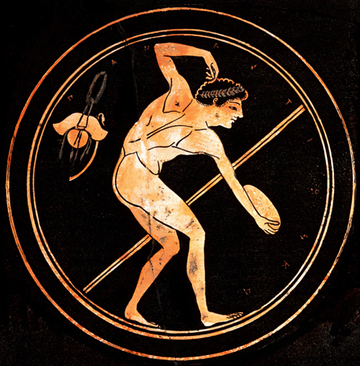More General Topics
- Facts About Greece
- Flag Of Greece
- Greece Climate
- Greece National Anthem
- Greece Olympics
- Greece Time
- Greece Weather
- Greek Army
- Greek Cross
- Greek Flag
- Greek Games
- Greek Government
- Greek Hairstyles
- Greek Name Days
- Greek Nose
- Greek Royal Family
- Greek Sandals
- Greek Time
- Greek Universities
- Greek Zodiac
- Population Of Greece
More Topic Categories
Related Destinations
Greek Games
 The Olympia, the Olympic Games held in Ancient Greece, was the most important sport event of Ancient Greece and took place in Olympia every four years after 776 BC. Athletes from all over Greece participated (and were later joined by non – Greek athletes) in these highly glamorous festivities. They were held until 393 AD, when the Byzantine Emperor Theodosius banned them.
The Olympia, the Olympic Games held in Ancient Greece, was the most important sport event of Ancient Greece and took place in Olympia every four years after 776 BC. Athletes from all over Greece participated (and were later joined by non – Greek athletes) in these highly glamorous festivities. They were held until 393 AD, when the Byzantine Emperor Theodosius banned them.AS mentioned, the Olympic Games were held every four years after the summer solstice. This four – year period was called “pentheteris” (five – year period) because Ancient Greeks also included the year of the event. These periods were named after the serial number of each Olympiad and were used as a time reference. The first ever recorded pentheteris began in the summer of 775 BC, although it is almost certain that it was not the first time the Games took place. During that time, the event was local and athletes participated in a single sport, stadion, a race.
As time passed, the Olympic Games gained considerable reputation and the ceasefire period during the Games was adopted by all city – states in the Greek territory. More types of races were eventually added to the sports calendar, followed by pentathlon, wrestling, chariot race, horse race, pagkration etc. The Games were open to all males, citizens, slaves, even “barbarians”, but women were strictly forbidden, probably because some athletes fought in the nude. However, one woman defied all, dressed as a man and infiltrated the crowd to watch her relatives compete. This was Kallipateira.
The Olympic Games kept their reputation throughout Greek Antiquity and all Olympic winners were praised by poets such as Pindar, Simonides and Vacchylides. However, during the Roman Period, the noble spirit of the Games was distorted with violent shows, causing Greek athletes to stop competing. Eventually, the Olympics lost their glamour. When Christianity became the main religion of the Roman Empire, the Olympics were considered a pagan festivity, thus in 393, Emperor Theodosius banned them.
Apart from their importance as a sports event, the Olympic Games also had a religious character. They were held in honour of Zeus, while a huge statue of the God stood in full glory in Olympia. Eventually, the number of the sports increased to twenty and the Games lasted five or six days. The winners received a kotinos, which was a wreath made of olive branches.
See Also:
 Athens Photos
Athens Photos
 Santorini Photos
Santorini Photos
 Crete Photos
Crete Photos
 Meteora Photos
Meteora Photos
 Corfu Photos
Corfu Photos


